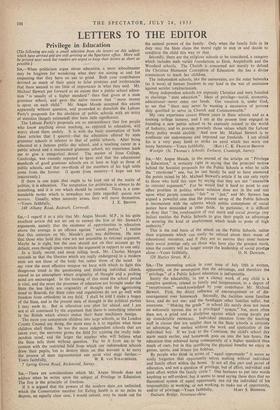• LETTERS TO THE EDITOR
Privilege in Education
(The following are only a small selection from the letters on this subject which have arrived and are still arriving at the Spectator office. More will be printed next week but readers are urged to keep their letters as short as possible.) SIR,—When politicians argue about education, a mere schoolmaster may be forgiven for wondering what , they are aiming at and for, suspecting that they have an axe to grind. Both your contributors devoted so much of their spaC'e to false premises and irrelevancies that there seemed to me little of importance in -what they said. Mr. Michael Stewart put forward as an axiom that a public school educa- tion " is usually of a higher standard " than that given at a state grammar school, and gave the naive reason that " more money is spent on each child." Mr. Angus Maude accepted this axiom apparently without question, and proceeded to demolish the Labour Party's proposals for the abolition of public schools with an array of statistics (largely estimated) that have little significance.
The Labour Party's proposals are so extraordinary that few people who know anything about teaching, as. opposed to education, will worry about them unduly. It is with the basic assumption of both these articles that I quarrel—that the education offered by state grammar schools is inferior to that of public schools. After being educated at a famous public day school, and a teaching career in a public school and a maintained grammar school, my experience leads me to give a categorical denial. The master of Jesus College, Cambridge, was recently reported to have said that the educational standards of good grammar schools are at least as high as those of public schools, and that two-thirds of the members of his high table come from the former. (I quote from memory—I hope not too inaccurately.)
If there is one topic that ought to be kept out of the realm of politics, it is education. The temptation for politicians is always to do something, and it is one which should be resisted. There is a com- mendable motto which is nowadays too little regarded: quieta non movere. Usually, when necessity arises, they will move themselves.


























 Previous page
Previous page